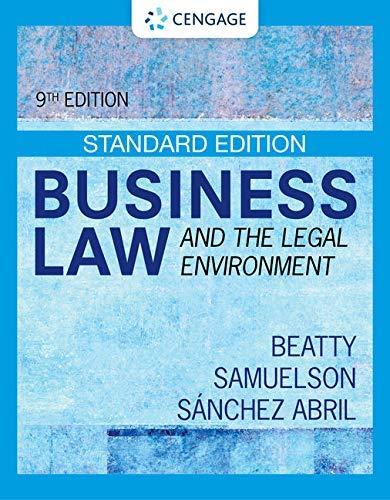Question
Read this: Business Judgement Rule, in the United States, is a law that assists to guard the board of directors of a corporation and protects
Read this:
"Business Judgement Rule, in the United States, is a law that assists to guard the board of directors of a corporation and protects against frivolous legal complaints about how it conducts business. In the United States, directors can use their reliance on professional advisors as a defense if they can show they had a reasonable basis to believe their advisors were both dependable and competent. The Fiduciary Standards are the component of the Business Judgement Rule with which I agree. The "obligation of care" and the "duty of loyalty" are two among them. The first is a responsibility to behave in a well-informed manner. The second requires directors to prioritize the corporation's interests over their own or the interests of others.
In contrast to the United States, directors in Australia are held to a higher standard. Directors have a statutory Duty of Diligence under the Corporations Act to take additional actions and make further inquiries to satisfy themselves about the information and advice offered. One thing the United States and Australia have in common is the Business Judgment Rule defense. The third element of the BJR in Australia is as follows: "Informs her or himself about the subject matter of the judgment to the extent she or he reasonably believes to be appropriate ..." (Blue Ocean). Directors in the US version of the BJR must make informed judgments, but they can do so by relying on expert advisors they reasonably believe to be trustworthy and competent. In the United States, there is no need to pursue additional investigation once professional advice has been acquired.
I would not change anything on the Business Judgement Rule. One aspect that I believe is most effective would be the idea that an organization should be permitted to select a choice without the danger of being sued by shareholders who object. This rule plays a dominant role that requires managers to develop effective decisions all the time is unreasonable. A court will not take action against directors as long as it feels they are acting rationally and in due diligence."
after reading this, what's your opinion on this?
- please go into detail, preferably more than a paragraph
- use your own words to help me understand why
-cite sources if needed (to look up later)
- paragraph form (no bullet points or lists)
Step by Step Solution
There are 3 Steps involved in it
Step: 1

Get Instant Access to Expert-Tailored Solutions
See step-by-step solutions with expert insights and AI powered tools for academic success
Step: 2

Step: 3

Ace Your Homework with AI
Get the answers you need in no time with our AI-driven, step-by-step assistance
Get Started


